- Home
- Penelope Lively
Judgment Day Page 3
Judgment Day Read online
Page 3
“Oh quite. In fact most of us aren't even conscious that it's going on. By the way I wish you wouldn't keep moving Human Documents of the Industrial Revolution off the shelf by the cooker. It's there for when I'm involved with tedious stirring operations.”
“Ah,” he said, “I'm sorry. I quite like the glasses, but do you have to keep them on, I thought they were for reading?”
“I was looking at the wine bottle label. They can come off now.”
“It hardly bears that close inspection.”
“I was wondering what the picture of the man stamping was. Treading grapes I suppose. Not that one imagines these were ever trod. But to get back to what we started with—you think charitable enterprises would be a good idea?”
“There must be something that needs interfering with. The school?”
“I am not,” said Clare with dignity, “intending a career of interference. And in any case the Parent Teacher Association is in the hands of a cabal comprising that estate agent opposite and various cronies. They don't like me. I alarm their wives and they don't care for my tone of voice. No chance of a coup d'etat there. Besides, there'd be no joy in it. It's a perfectly good school, all one could do is raise money for the minibus fund. No standing at the gates with a placard demanding educational justice. Sorry—have to think again.”
“Perhaps it's not really a problem,” he suggested. “Since you say you're perfectly happy.”
“I never said any such thing. Who ever experienced perfect happiness? Certainly not me. Not with my temperament, but I'm as happy as I would ever expect to be, and grateful with it.”
“That's all right,” said Peter. “Don't mention it.”
“Not to you, you nit. To something altogether more metaphysical.”
“Nevertheless, I think local involvement might be no bad thing.”
“Putting down some roots?”
He began to grind coffee. “You've always rather dug yourself into places before. What about something else, then? A course at the local university?”
“No thanks. I've had quite enough education already, goodness knows what any more would lead to. No, that won't do. We shall have to give the matter some serious thought. You may well be right. And now tell me about this Brussels thing.”
* * *
Sydney Porter said good night to the other members of the Parochial Church Council outside the vicarage and crossed the Green to his house. Passing the church, he paused for a moment to look at it, thinking both of its ailments and its antiquity. He had been surprised to learn of its age. Sydney was not very strong on history, he knew; doing a sum in his head he reckoned the foundation of the church as not long after 1066, a date that was familiar. Well, given that it stood to reason that it wouldn't be in very good shape, structurally. Though only bits of it were from then, of course, most of it was much newer. Funny how you never really gave a lot of thought to how long a place had been there; you acted as sidesman, Sunday after Sunday, saw to the hymn books, locked up on alternate nights, without ever really thinking about that.
The church on the corner of Mansell Road had been big and black, not like this at all, a big black London church. It had dwarfed the houses, rather than the other way about. Coming back that morning in 1941 it had been the only solid thing left, standing foursquare alongside the row of blasted shells. Only later, going in, had he seen the wreckage within, the floor and seats white with fallen plaster, the chancel open to the sky, the altar a mess of splintered wood and rubble. He had stood there a long time, alone; outside the rescue squads were working still, their boots crunching on broken glass.
They were going to be hard put to it to raise all that cash; and the vicar, not a go-ahead sort of man, either. A long haul, it would be. Not that there wasn't money about, you only had to look around you to see that. But not much of it would come the way of the restoration fund, Sydney suspected. He let himself into the house and went into the kitchen to make a cup of tea. Tea and a biscuit, and the television news, and see what was on after, and an early night if it wasn't up to much. He stood at the window while the kettle boiled; dark now and lights at windows around the Green, discreet, glowing, curtained squares, except the big house by the vicarage where they were bright and bare so that you could see clean into the rooms, a man and woman in one, a kitchen, sitting at a table with glasses in their hands. Those new people. I've got good eyesight, Sydney thought, man of my age, good as when I was in the Navy, all but; he drew his own curtains and went through into the lounge.
He sat in the chintz-covered chair that had once been in the Mansell Road house while information was expertly and expensively conveyed to him: an assessment of the political situation in Namibia, a rundown on Britain's position vis-à-vis the European monetary fund, a consideration of an impending industrial dispute (opposing points of view discretely outlined}. Sydney drank tea and wondered about switching to round-pod french beans this year. On the screen, there was talk now of distresses in some far-off place; fleeing figures in a street, a man crouching with a rifle. A child crying. Sydney watched and sighed, stirred by the recollection of feeling, rather than feeling itself. Poor wretches. His ghost walked among them, outraged by the world. But none of this could touch him now; lightning does not strike twice, and in any case there was nothing left for it to strike.
Football results rolled up, and the weather. Nothing worth watching after. Sydney switched off and prepared to go to bed.
* * *
Next door, Keith Bryan also watched the news. The row he'd had with Shirley about forgetting to phone the TV repairman had petered out when he discovered that in fact it was only the plug that was faulty. Just as well, in the event, or there'd have been a hefty charge for damn all. Now, he sprawled apathetic in front of the set. At one point he was aroused and annoyed by the discovery that power workers pull in over a hundred a week. He also noted the make of car used by the chairman of British Rail, and a sexy air hostess behind the right shoulder of a departing American politician. When the newsreader started talking about unemployment figures he went out to the kitchen for a beer. There, he caught sight of himself for an instant in the mirror by the door—a shortish fellow with round shoulders reaching into the fridge for a can of Pale Ale. And knew with a spurt of anger that there was some mistake. Keith Bryan was somewhere else—a bullish, bronzed black-haired chap in a cricket sweater, with a buttery blonde in tow, drinking shorts at a bar aglow with horse brasses and copper pans. He went back to the sitting room. “Don't ask me if I want one, will you?” said Shirley. He flung himself back into his chair without looking at her. On the television screen, people shot each other in the streets of some American city; in fantasy, not fact, as he recognized from the excitable camera work and the nonchalance of the protagonists. “Shut up,” he said, “I'm following this series.”
Chapter Three
The school, Laddenham primary, was seven minutes adult walk from the Green and various distances where children were concerned, according to age. The Coggan girls, accompanied each way by their mother, took between eight and ten minutes. Martin Bryan, when late, could do it in four and a half, running, or anything up to an hour otherwise, going by the churchyard and through the gap in the car park wall and over the building site, or dawdling along the High Street with a stop off at the sweet shop. The Paling children, Anna and Thomas, could also extend the journey almost indefinitely, if unaccompanied; when driven by their mother in the white mini it was three and a half minutes dead, door to door.
Martin Bryan and the Coggans went to the primary school because that was where children went to school. The Palings went there because Clare and Peter, who had opinions about education, and knew a thing or two, had observed that a good state primary school is as good as anything provided by the private sector and free into the bargain. The Coggan girls and Anna Paling did not consort out of school hours because Anna thought Tracy and Mandy silly. Thomas and Martin did not consort partly because Martin was two and a half years older
than Thomas, thus laying on him the onus of any overtures that might be made, and partly because Thomas had once seen Martin crying in the school lavatory and had been intolerably embarrassed. In any case, Martin did not consort much with anyone. If they found themselves returning to the Green at the same time, they walked separately, or on opposite sides of the street. But then, so did the two Palings, who had proper ideas about indifference to one's sibling when released from the conventions of the home.
The school was bright and airy and a credit to the system. The walls were covered with eye-catching examples of child artwork; witches and dragons vied with the life-cycle of the frog and what people wore in Elizabethan times, in cheerful evidence that the life of the imagination was not despised in these parts. The teachers tended to be young; some were male and bearded. The children gave every indication of well-being; the place buzzed with activity and the early morning influx showed no sign of reluctance. The school dinners were ample and nutritious.
Not many of the children had a speech that could at once be recognized as of the place: just a few. The Laddenham voice, subtly distinct from the Midlands but not yet opening out into the fullness of Gloucestershire and parts west, was confined to those few whose family names might have been found on the tombstones in the churchyard of St. Peter and St. Paul, and, in some cases, not even to them. Most children spoke the unplaceable and even classless English of radio and television performers; the language they used had the same ubiquity. Only occasionally (the Opies would have been gratified} did a childish code word surface that was entirely local in origin: a word for truce, the dialect of scatology, an insult. The Paling children, within a matter of weeks and barely conscious that they were doing so, had learned to temper their accents, slip into a more anonymous pronunciation, and call things by the right names. At home, they reverted to their usual style, so that for many months their parents were unaware of this chameleon dexterity, until one day Clare, waiting outside the school playground, heard with amazement her son shouting in an alien tongue. She had the tact not to comment, but thought about the matter. It struck her as curious that the ability—willingness, perhaps—to accept the requirements of a place should come so much more readily to children. One could look at it in two lights, of course: it could seem a sheep-like conformity, or alternatively a refreshing knack of discarding old habits. Either way, it was as though the spirit of place, nowadays, exerted its power only over the young.
The spirit of place was in any case hard to detect in Laddenham. There was no shop or other building, in the High Street, whose counterpart could not have been found elsewhere: Boots, Dewhurst, Tesco; a nineteenth-century ironmonger's facade, a fifties brutalist bank, an Edwardian pub. The road signs, recently renewed and standardized, pointed you to outlying hamlets in lettering that suggested cities the size of Birmingham. The Midland Bank had a clock recording the time of day on the eastern and western coasts of the United States. Only the church and a few of the older houses were a reminder that this place lay on the limestone spine of England, and was built from its own bones. The new housing estates, rushed up to meet the boom of fifteen years ago, were in brick or a garish reconstituted stone of inflexible texture. They encircled the old village center, the High Street, the church and the Green, their street names quaintly rural and suggesting quite another ambiance: The Grove, Willow Way, Rivermead, Swan Lane.
Nearly everyone worked in Spelbury, the thriving town of which Laddenham and other expanded villages were satellites. Spelbury made the internal organs of radios and televisions, a few selected car components, women's tights and stockings, and processed frozen foods. It was a place that had been designated for prosperity immediately after the war, a London overspill town, and had flourished accordingly: industry had come, people had come, houses had been built, and Spelbury had tripled, quadrupled in size. Only the street plan of the town center, an elongated triangle enclosing an open space, and the Friday cattle market remembered its ancestral function. It was still in trade, of course, but no longer trade of a local nature: pigs and sheep and cows. Nowadays, the container lorries feeding Spelbury's factories might come from Scotland, from the east coast, from the continent.
Ten miles away, R.A.F. Willerton sprawled runways and silver hangars and several acres of red brick housing for personnel across the landscape, and provided considerable extra purchasing power for the Spelbury shops, and clientele for the Saturday-night discos, the pubs, and the two cinemas.
Aircraft noise split the skies, periodically. Laddenham could congratulate itself on not being beneath one of the main flight paths. On the whole, the aircraft swept north up the river valley before turning right for Europe and the Middle and Far East, or left for elsewhere. The gleaming, backswept planes were alleged by knowledgeable locals to carry hydrogen bombs; others disputed this. The less sinister transport aircraft, low slung and erect-tailed, lumbered about the horizon all day long, so much a part of the scenery that a landscape painter, seeking local exactitude, would need to incorporate one, pottering above the low hills, the hedge-striped valleys, the greens and golds and fawns of the agricultural midlands.
The R.A.F. display team, the Red Devils, was based at Willerton.
The first time Clare Paling saw them was on the morning after her conversation with Peter about her occupation—or lack of it—and three days after her exchange with George Radwell in the church. She had dropped the children at school, been to Spelbury to do the week's shopping at Sainsbury's, and then, on a whim, driven straight out of the town in the opposite direction to Laddenham. She had stopped the mini, presently, on the side road, at a point where the road crossed a small stream by way of an old stone bridge; a delectable riverine landscape of willows and watermeadows and buttercups. She sat on the wall of the bridge and saw flowing weed, like green hair, with little white flowers blooming just above the water, dragged this way and that by the current. It was early summer. The grass was thick, the trees in full leaf; the willows along the stream bank were a sharp yellow-green against the steel gray of a rain-cloud behind them, a miraculous effect of light and texture. And then suddenly there was a disturbance of air; a wind that sprang up from nowhere; a blackbird shrieked; a bullock cantered off with its tail up. Across the skyline, above the willows, across that pewter backcloth there swept a scarlet aeroplane, not a hundred yards away, not, it seemed, a hundred yards above the ground, a huge scarlet steel dart, quite soundless. It was there above the trees—and then gone so quickly it could have been a hallucination.
There came another, and another, and another, with only yards between them. She stood up, her hand to her mouth, amazed. And then the sound arrived: a great tearing roar, rising and falling, once, twice, three, four, five times—once for each plane.
It was astonishing. She was filled with wild exhilaration. The shock of it. The beauty of those shapes fleeing across the dark sky, the brilliance of the color; the sudden intrusion, the sense of something quite merciless and irresistible blasting its way across the tranquil countryside. There was a hot metallic smell in the air now. And, looking away and upwards, she saw them again, but high, high up, thousands of feet up, tiny scarlet gnats flying in tight formation, making an arrow that vanished into a gray heap of cloud.
She found the whole thing intensely stimulating and drove home too fast, narrowly missing an accident, the sight of the red aeroplanes still printed on her eyeballs.
* * *
Sydney Porter was erecting runner bean poles when the Red Devils came over Laddenham. He did not see them but was assaulted by the noise, seconds after they had passed; it was as though the whole sky raged, and he thought at first of thunder, but it was clear and bright now, with just a distant cloud bank piled up away beyond Spelbury. He stood there, looking up at the sky, and then the girl called over the fence, Shirley Bryan next door, “Hey—did you see, Mr. Porter? Those formation fliers from the R.A.F.—fantastic!” He shook his head.
She was hanging up washing, inefficiently, dropping t
hings into the dirt and then giving them just a quick shake before pinning them up. Now she came and leaned up against the fence, chatting on about how she'd never have the patience to grow all those veg, but it must be nice, not having to go to the shops so much. “But you're ever so methodical, aren't you? I've seen you in Tesco, with your list, ticking things off.” She giggled. “Don't think I was spying—just I caught sight of you across the aisle. Wish I could be so organized. Keith's always on at me for the lousy housekeeper I am. Well, he could have guessed as much when he married me, frankly.” She laughed again, a laugh that Sydney found irritating, a mannerism merely. She yawned, a huge uncovered yawn so that he looked away quickly, back to the runner beans, a more engaging sight altogether. Now she was on about her husband, embarrassingly, personal comments that one would prefer not to hear; Sydney bound poles together with string and tried to think about something else. The church, this appeal, now that was a thing they'd have to give their minds to, over the next month. Fund-raising. Letters to important people, the big folk round about, the Chamber of Commerce and that. “Toothpaste,” said Shirley Bryan. “All over the basin. When he's spat. I tell you, I could scream sometimes. Oh well, that's marriage. You should be thankful you stayed a bachelor, Mr. Porter.”
He clamped the last two poles together, wound the string and clipped off the end with his knife. Tested the line for strength: firm enough. “I'm not a bachelor” he said to the bean poles “Not me. My wife died. Long time ago.” And heard her noises of surprise and regret and interest.
He picked his things up, the string and the knife and the spade, and stumped back toward the house, not looking at her again. Angry at being jumped into that much self-exposure. But he couldn't tell a lie, not even a lie by omission, never had been able to.
* * *
George Radwell was on the telephone to the secretary of the Parish Council about the booking of the village hall when the Red Devils went over. The noise blotted out all; he sat there mouthing, saying into the roaring air, “Not a Saturday, we thought, a weekday we'd be likely to get more people, would next Thursday be …” And then the row receded and gradually Charlie Webb came through saying “Eh? What's that, Vicar? Can't hear you, terrible line. Just say that again, would you.”

 The House in Norham Gardens
The House in Norham Gardens Family Album
Family Album Life in the Garden
Life in the Garden Oleander, Jacaranda: A Childhood Perceived
Oleander, Jacaranda: A Childhood Perceived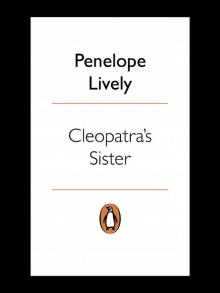 Cleopatra's Sister
Cleopatra's Sister Next to Nature, Art
Next to Nature, Art A Stitch in Time
A Stitch in Time Moon Tiger
Moon Tiger The Photograph
The Photograph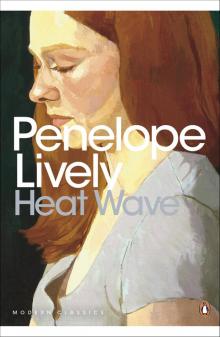 Heat Wave
Heat Wave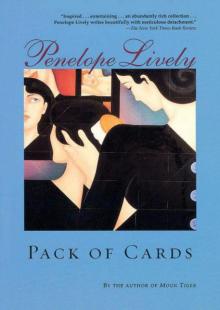 Pack of Cards
Pack of Cards Spiderweb
Spiderweb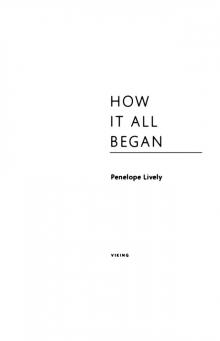 How It All Began
How It All Began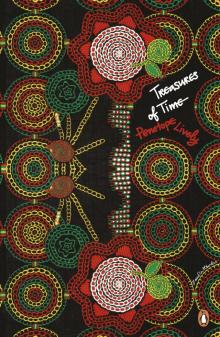 Treasures of Time
Treasures of Time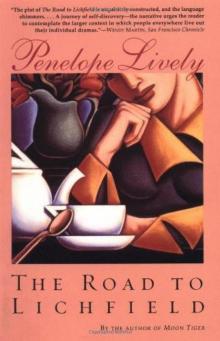 The Road to Lichfield
The Road to Lichfield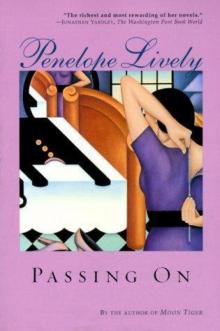 Passing On
Passing On Making It Up
Making It Up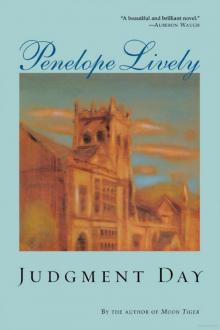 Judgment Day
Judgment Day The Purple Swamp Hen and Other Stories
The Purple Swamp Hen and Other Stories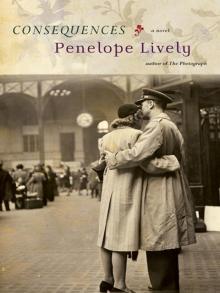 Consequences
Consequences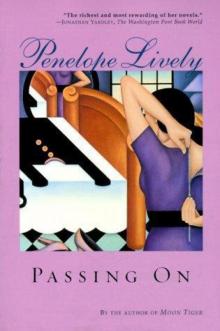 *****Passing On*****
*****Passing On*****